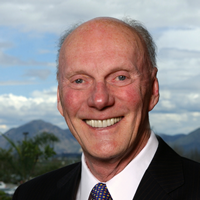
The term "Renaissance Man" tends to be overused, but in Fred Kavli's case, it's doubly appropriate. Starting out at age 14 as an inventor and entrepreneur in the midst of World War II, he went on to become a physicist, investor and businessman. And through his philanthropic work, he is laying the foundations for a new renaissance of 21st century scientific research and discovery.
Born in 1927 in Norway, Mr. Kavli honed his business skills at an early age, running a small business with his older brother selling wooden planks to furniture companies and making wooden briquettes to fuel gas generators. However, he was also always fascinated by science and the workings of the universe, inspired by the magnificent sight of the aurora in the Norwegian night sky. Encouraged by a teacher who had worked with the legendary physicist Niels Bohr (1926 Franklin Medal), Kavli concentrated on physics, graduating in 1955 with an engineering physics degree from the Norwegian Institute of Technology, his education largely financed by his teenage business endeavors. Almost immediately, his restless, ambitious nature brought him west, first to Canada and then to the United States. It was good timing for a brilliant young physicist: America was scrambling to build its first intercontinental ballistic missile, and Kavli found a job in a small Los Angeles company designing and building sensors for the new Atlas missile. Two years later, he rose to Chief Engineer, but Kavli wasn't satisfied. His strong independent streak and entrepreneurial enthusiasm led him to form his own company, Kavlico, which specialized in building sensors for aeronautic, automotive, industrial, and space applications.
Kavlico prospered in those heady times of a burgeoning aerospace program and defense spending, and under Mr. Kavli's creative, innovative leadership, became a world leader in its field. Still, becoming a successful businessman and inventor was not enough for him. He built a personal fortune through careful and intelligent investing, mostly in real estate, and began sharing the fruits of his labors through numerous donations to his local community in California, including the establishment of a performing arts center and endowment of several university professorships.
In 2000, Mr. Kavli got restless again. He stepped down as CEO of Kavlico and sold the company, using the proceeds to establish The Kavli Foundation, dedicated to supporting basic scientific research for the long-term benefit of humanity. The Foundation sets up and funds research institutes at various universities in nanoscience, astrophysics, theoretical physics, and neuroscience—visionary disciplines which Kavli believes hold the most promise for far-ranging and exciting discoveries. These centers, 15 so far worldwide, conduct groundbreaking basic research with a view not toward short-term payoffs but the long-range advancement of human knowledge and civilization.
And still it wasn't enough. In 2008, at age 81, Mr. Kavli announced a new project: the Kavli Prize. Every two years, under the aegis of the Norwegian Academy of Science and Letters, three $1 million prizes are awarded for the most innovative and creative work in nanoscience, astrophysics, and neuroscience. Unlike many other science awards, the Kavli Prize is intended to recognize and energize the ongoing careers of researchers with great potential whose most important work might yet lie in their future.
Still active and ambitious well into his eighties, Mr. Kavli remains fiercely dedicated to the passions that have driven him throughout his life: understanding the universe and using his talents and resources to enhance the human condition through science. In the form of The Kavli Foundation and Prizes and the many scientists they encourage and support, Fred Kavli's influential contributions to the scientific enterprise will continue to resonate, extending a renaissance of discovery throughout the rest of this century and beyond.
Information as of April 2011

